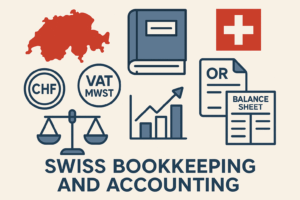Swiss Bookkeeping and Accounting Guide
Swiss Bookkeeping & Accounting Guide (CO • Swiss GAAP FER • IFRS)
Practical hub for founders, CFOs and advisors. Updated:
Swiss Accounting Guide (CO & Swiss GAAP FER)
Size thresholds, components, audit, deadlines, and year-end workflow.
Cash-basis in Switzerland
Eligibility, setup, MWST handling, and when to switch to accrual.
Group Accounting (Swiss GAAP FER / IFRS)
Scope, eliminations, FX, deferred taxes, disclosures & timelines.
Swiss Accounting & Bookkeeping Service
Packages in CHF, monthly bookkeeping, annuals, MWST and IFRS packs.
Short introduction
Swiss bookkeeping and financial reporting are governed by the Swiss Code of Obligations (CO). Requirements scale with company size—from simplified cash-basis for micro entities to double-entry bookkeeping, statutory annual financial statements and, where required, a consolidated financial statement. This hub summarizes the essentials and links to deep-dives.
Foundations & scope
Businesses must keep books and prepare annual financial statements. Depth depends on legal form, revenue/balance-sheet total, and headcount. For thresholds, components (balance sheet, income statement, notes, cash flow where applicable), audit types and disclosure, see the Swiss Accounting Guide.
Bookkeeping obligations by company size
Micro entities / cash basis
Very small businesses may use simplified cash-basis accounting instead of double-entry. It records income, expenses and net assets in a streamlined format. Eligibility, setup and MWST specifics: Cash-basis Accounting Guide.
Full double-entry bookkeeping (LLC/AG/GmbH/SMEs)
Once thresholds are exceeded—or for most capital companies—double-entry bookkeeping is mandatory: day-to-day postings, accruals/deferrals, AR/AP, fixed assets and a structured monthly/quarterly close. Annual statement content, deadlines and audit requirements: Swiss Accounting Guide.
Group accounting
A consolidated financial statement may be required. Key topics: consolidation scope, eliminations, unrealized profit adjustments, currency translation and reporting. Frameworks include Swiss GAAP FER or international standards. See the Swiss Group Accounting Guide.
Ongoing bookkeeping & month-end
Robust books start with document control (timely capture, SME chart of accounts), approval workflows and reconciliations (bank, AR, AP, VAT, payroll). Periodic closes keep figures reliable: provisions/accruals, depreciation, inventory valuation and intercompany reconciliations. Turn this into an efficient year-end workflow: Swiss Accounting Guide.
Value Added Tax (VAT)
VAT depends on revenue and activity. Core choices: effective method vs. net tax rate, filing periods, correct tax codes in the ledger, export/reverse-charge treatment and expense evidence. A proper MWST reconciliation each period avoids year-end surprises. Practical notes are embedded across the guides.
Year-end closing & deadlines
Statutory accounts include balance sheet, income statement and notes; depending on size, also a cash flow statement and a management report. Observe deadlines, approvals and—where applicable— audit requirements. Checklists and timelines: Swiss Accounting Guide; for group matters see the Group Accounting Guide.
Tools & internal controls
Whether cloud or on-prem, focus on segregation of duties, roles & permissions, digital document workflows (e.g., AP approvals), integrations (bank feeds, payroll, e-commerce) and standardized reporting for management and authorities to streamline closes and support audit & tax compliance.
Next steps
Not sure if cash-basis fits, want a monthly close, or need group reporting? We can help with setup, process design and closing. → Swiss Accounting & Bookkeeping Service • or Request a proposal


